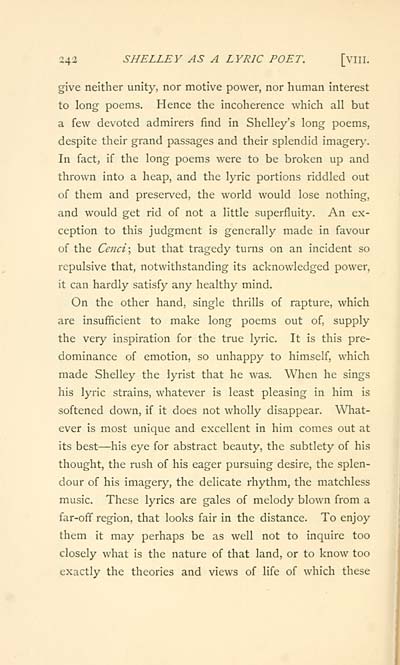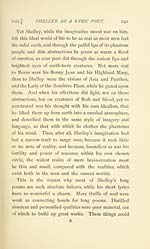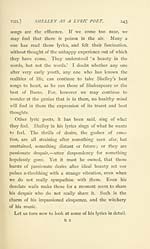Ossian Collection > Aspects of poetry
(258)
Download files
Complete book:
Individual page:
Thumbnail gallery: Grid view | List view

242 SHELLEY AS A LYRIC POET. [vill.
give neither unity, nor motive power, nor human Interest
to long poems. Hence the incoherence which all but
a few devoted admirers find in Shelley's long poems,
despite their grand passages and their splendid imagery.
In fact, if the long poems were to be broken up and
thrown into a heap, and the lyric portions riddled out
of them and preserved, the world would lose nothing,
and would get rid of not a little superfluity. An ex-
ception to this judgment is generally made in favour
of the Cenci\ but that tragedy turns on an incident so
repulsive that, notwithstanding its acknowledged power,
it can hardly satisfy any healthy mind.
On the other hand, single thrills of rapture, which
are insufficient to make long poems out of, supply
the very inspiration for the true lyric. It is this pre-
dominance of emotion, so unhappy to himself, which
made Shelley the lyrist that he was. When he sings
his lyric strains, whatever is least pleasing in him is
softened down, if it does not wholly disappear. What-
ever is most unique and excellent in him comes out at
its best — his eye for abstract beauty, the subtlety of his
thought, the rush of his eager pursuing desire, the splen-
dour of his imagery, the delicate rhythm, the matchless
music. These lyrics are gales of melody blown from a
far-off region, that looks fair in the distance. To enjoy
them it may perhaps be as well not to inquire too
closely what is the nature of that land, or to know too
exactly the theories and views of life of which these
give neither unity, nor motive power, nor human Interest
to long poems. Hence the incoherence which all but
a few devoted admirers find in Shelley's long poems,
despite their grand passages and their splendid imagery.
In fact, if the long poems were to be broken up and
thrown into a heap, and the lyric portions riddled out
of them and preserved, the world would lose nothing,
and would get rid of not a little superfluity. An ex-
ception to this judgment is generally made in favour
of the Cenci\ but that tragedy turns on an incident so
repulsive that, notwithstanding its acknowledged power,
it can hardly satisfy any healthy mind.
On the other hand, single thrills of rapture, which
are insufficient to make long poems out of, supply
the very inspiration for the true lyric. It is this pre-
dominance of emotion, so unhappy to himself, which
made Shelley the lyrist that he was. When he sings
his lyric strains, whatever is least pleasing in him is
softened down, if it does not wholly disappear. What-
ever is most unique and excellent in him comes out at
its best — his eye for abstract beauty, the subtlety of his
thought, the rush of his eager pursuing desire, the splen-
dour of his imagery, the delicate rhythm, the matchless
music. These lyrics are gales of melody blown from a
far-off region, that looks fair in the distance. To enjoy
them it may perhaps be as well not to inquire too
closely what is the nature of that land, or to know too
exactly the theories and views of life of which these
Set display mode to: Large image | Transcription
Images and transcriptions on this page, including medium image downloads, may be used under the Creative Commons Attribution 4.0 International Licence unless otherwise stated. ![]()
| Early Gaelic Book Collections > Ossian Collection > Aspects of poetry > (258) |
|---|
| Permanent URL | https://digital.nls.uk/78388368 |
|---|
| Description | Selected books from the Ossian Collection of 327 volumes, originally assembled by J. Norman Methven of Perth. Different editions and translations of James MacPherson's epic poem 'Ossian', some with a map of the 'Kingdom of Connor'. Also secondary material relating to Ossianic poetry and the Ossian controversy. |
|---|
| Description | Selected items from five 'Special and Named Printed Collections'. Includes books in Gaelic and other Celtic languages, works about the Gaels, their languages, literature, culture and history. |
|---|

